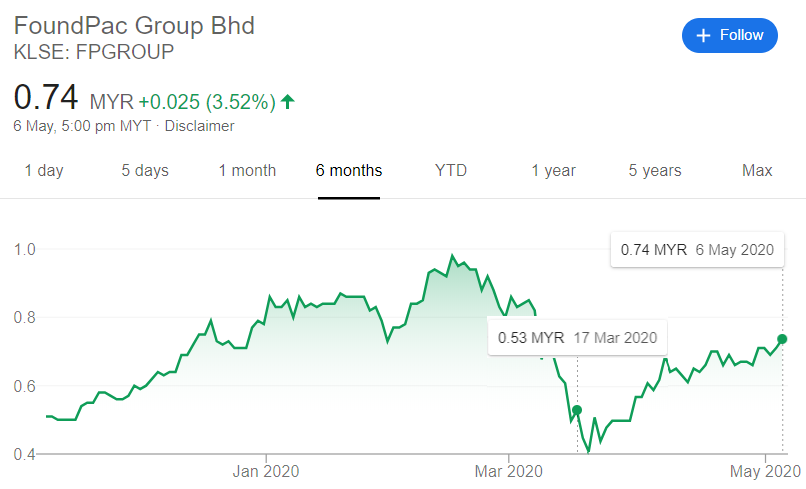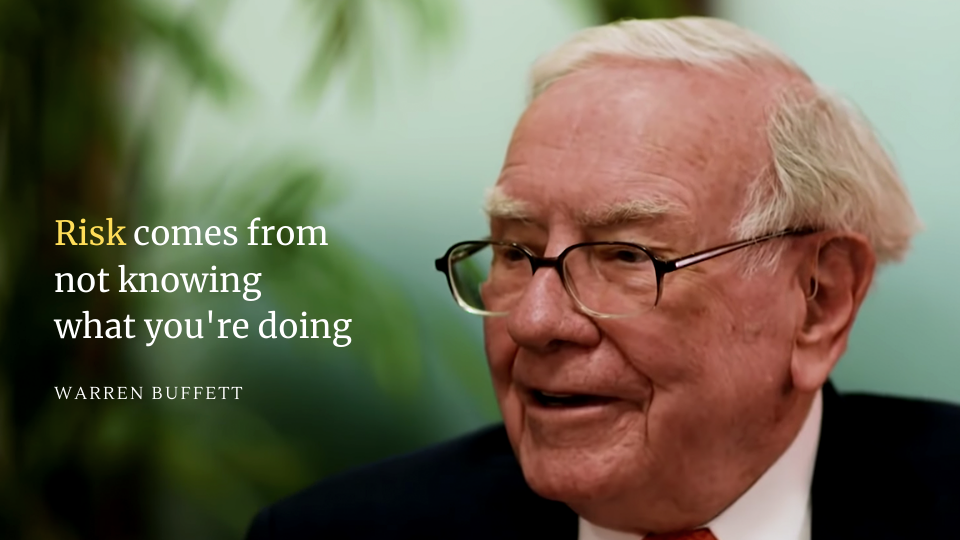I panic sell my stocks on 11th March 2020.
Yeah! I know I shouldn’t.
At that moment, it was too nerve-wracking for me to see my portfolio in red yet totally unprepared for the bear market. I always do not have enough cash reserve for that. I knew it was too late to sell on that day, but I still did. That decision has calmed me down for a few days but soon becomes a painful and regretful memory to be reflected.
On the bright side, several weeks of staying out of the market gave me some clarity about my investing strategy and the mistakes I made. I take this opportunity to restructure my investing approach, read more books about investing, review back all my favorite stocks, and screen for new stocks. Besides that, I decide to make use of my personal experience by sharing the painful lessons I learned to my readers.
Oh man.. Why Did You Panic Sell Your Stocks?
Good question, buddy. The answer is really simple: Emotion.
Emotional Investing

Emotion is a very dangerous thing when comes to investing.
Since the stone age, we humans have been carrying the survival mindset with us. When it comes to handling our own money, our survival mindset will be triggered and start interfering with our investing decisions.
We are greedy when we are able to earn more money, and we are fearful when we are losing money.
In our investing journey, when the stock price continuously rises, greed will persuade us to join in the bandwagon. We don’t want to miss the profit opportunity right in front of our eyes.
But when we see our share price keep falling continuously, the feeling of anxiety and fear will start thickening. Losing money is indeed painful. It is our instinct to hit that emergency button when something bad happened.
Yeah, that’s pretty explained why my fear of losing money made me panic sell my stocks. Initially, I never thought I will be the one who panic sell my stocks, not until the bear market came unexpectedly and hits my portfolio hard.
It is like you will never learn how to stand up and walk properly until you fall down. Sometimes you are destined to make that stupid mistake, so you will learn and remember it for the rest of your life.
How to Overcome Emotion in Investing
Don’t monitor your stock price every single second
Every weekday at 9 am, my hand will automatically help to grab my phone and my finger helps to open that brokerage app, refreshing on today’s stock prices. Surprisingly, I just realize that this is such a bad habit.
This is totally fine when the market is neutral or good. But when the market goes upside down, looking at my stocks every day really triggers my negative emotions. The anxiety in me is growing bigger like Mario just ate a mushroom.
After that incident of “panic sell”, I start to practice not to look at the stock price every day. Although I still have a REIT stock which still in red, staying away from the stock price helps a lot.
Don’t read too much on other people opinions about stocks
The stock market is full of noise. More often, the news and analysis from the experts and the so-called “gurus” can cloud your decision more than give you a clear insight. If you joined a lot of Facebook groups about investing, you will notice most of the posts usually stimulate the FOMO feeling inside you.
“This stock is pretty cheap now, and will rebound fast after pandamic!”
“Bear market is coming tomorrow! Sell all your stocks now!”
I consider these comments as junk foods. They don’t provide any nutrient at all. Though I do see some users provide insightful investing tips and values.
Don’t just try to eat all the info and opinions provided by everyone. Learn how to identify junk foods and healthy foods, so you can get the good nutrients that help you to do better in investing.
Don’t buy based on “gurus” tips and signals
The FOMO (Fear of Missing Out) is really strong when you see someone earned a 50% return from day trade speculation. Then you want to join the herd to receive signal, buy low and sell high. Don’t do that!
It is very sad to see most stock investors are actually speculators. Honestly, I used to be one too. At the end of the day, speculation really consumes a lot of your time and emotion as well.
In this February, I did try out some signals given in a free Telegram group. The guru will give you the entry point and a suitable target price, which usually helps you earn a 5% to 10% quick return in a few days. Then the next day, the global markets plummet as coronavirus worsen. I end up 10% losses from the stocks I bought based on signals. (Still not so bad lah because I invested just small money)
Did you know how these gurus get their signals? It’s known as Technical Analysis. It utilizes chart analysis and calculation on historical prices and trading volumes to forecast the future price. In simple words, they are not 100% accurate.
The lesson is, always do your own homework about the stocks you will buy. Its price may drop in the short term, but if your stocks have that fundamental values, it will eventually go up in the long term.
Cash Reserve

Before I did my panic sell, I always have a mindset that cash that stayed in the account and not being invested is a “wasted” fund. It is because the cash will lose its value by inflation over time.
Well, it makes sense, but…
I found that it doesn’t fit to all type of investment strategy. Here’s why.
Individual Stock Investor vs Fund Investor
There are two type of stock investors: Individual Stock Investors & Fund Investors.
Fund investors focus to invest in fund type asset classes such as ETF, mutual fund, unit trust, or Robo-advisors.
While individual stock investor usually invest in individual companies chosen by them.
So what cash reserve has to do with these two type of investors?
The Difference in Investing Pattern
For fund investors, they can just invest their money consistently because they only need to invest one fund.
However, this doesn’t work for individual stock investors. When the price of stocks they invested dropped, they should have a cash reserve to average down it. But when the price of stocks goes up, it is usually wise to remain idle and don’t chase high.
While it is wise to invest consistently if you are investing in the fund, this may not sound wise if you are investing in individual stocks. You have several stocks on hand (if you don’t, you should consider diversifying!). Which stock are you going to invest consistently?
That explains why we (individual stock investors) should always have cash reserves. It helps to reduce the chance of panic sell and allows us to take advantage of the market crisis by averaging down our shares.
Fund Investor Always Have the Edge
Having said that, this is why average people (like me) should invest in ETF or index funds. They are naturally diversified, easier to invest, less emotion exposed, and you only need to focus on one or two funds.
Personally, I recommend Malaysians to invest in Stashaway (Robo-advisor in Malaysia that exposed to US ETF) because it is more convenient compared to directly invest in US ETF or index fund. If you are interested to invest with Stashaway, you can use my referral code. (By using my referral code, you and I will get RM30K managed for free in 6 months)
Stay Invested
“Stay invested”, the top advice of March 2020 when the market crash like nobody’s business. As much as logical it sounds, there are still many people (including me) who can’t digest this advice. Stay invested is easy when the market is doing good. But during the market crisis, it becomes extremely challenging.
Let me use myself as a white mice to show you the importance of “stay invested”.
The Damage of Not Staying Invested

We take Foundpac as an example. I have 800 lots (80,000 units) of its shares at the end of February. My average price of Foundpac shares is around RM0.67 per unit. Then its stock price starts to drop mercilessly since 2nd March. As I feared it goes down more, I decided to sell all of them for RM0.54 each unit. The total realized loss is RM10,400.
What if I don’t sell them and stay invested?

Let us look at the current price of Foundpac today (6th May). It’s already RM0.74!
If I had stayed invested, I wouldn’t lose that ten thousand. Furthermore, I can now reduce its market risk by selling some of its shares, with a little profit some more!
Okay, I should stop putting salt on my wound. With the example above, now you should see it clearly, right?
The Importance of Knowing The Companies
I know some of the investors are buying stocks based on recommendations from other people. When you have no idea what kind of companies you have bought, you can never have that confidence to hold them during the market crisis.
You have no idea what is the financial health of the company you hold, how its industry doing during the pandemic, and what products or services does it even sell.
Ignorance in investing is a huge cost. Okay, I know I’m not the right person to give you advice. So I have my idol Warren Buffett here to share some wise words with you.

So please, I beg you lah! Do some research before you even start buying the share. I know sometimes when you found a sweet stock with its price keeps on rising, you will have that mindset “buy first, know later”. It’s like you meet a good-looking ladies or guys and think “tackle first, know later”.
How can you so sure that sweet stock will have good fundamentals before even looking at its financial reports? Even if you have confirmed that it is a good stock but its price already spiked more than 20%, don’t be frustrated. Keep calm and calculate the value of that stock first.
If the current price is still under fair value, you can buy it. If that stock is already overvalued, then you can put it on the watchlist and wait for the opportunity. (I bet there are still opportunities in 2020)
Long Term Investing Mindset
I always thought I was a long term investor, but reflecting back my previous investing style, I laugh at myself.
I buy a stock when its company quarterly report is excellent, then sell the stock when its company quarterly report is bad. While this sounds logical and nothing wrong with it, this is such a short-sighted way of investing.
Look at Fundamentals, not Results
It is true that companies need can sustain their profit growth every quarter, but there is no one perfect company that able to do that. If there is a logical reason behind the bad quarter report and the fundamental values of the company still there, we should hold the share, not to sell it because of bad reports.
Frankly speaking, developing a long term mindset during the investing journey is not easy. The stock market fluctuation provides us a lot of opportunities to earn short term profits. In the past, I did earn some short term profits. But I also lose some serious money in the short term.
In general, if we don’t want to get emotionally wash away by the market crisis like the Covid-19 pandemic, we should always stay away from this kind of speculation activity. Things might go in your favor at first, but it will not last long.
To be a resilient investor, always buy shares with a long term mindset.
Conclusion

In the nut shells, here are the 4 lessons I learned which you can takeaway and keep in mind:
- Avoid emotion investing – Don’t look at stock prices every day, don’t read other people’s opinions too often, don’t buy based on people’s tips.
- If you are an investor who invests in individual stocks, always have a cash reserve for any market downturn.
- Know your companies and stay invested with them.
- With a long term mindset, you will hold your shares better and not panic sell them.
It is okay to make mistakes during our investing journey. The most important thing is, we learned something from the experience. In my case, I did a panic sell but I learned some lessons from it. I used to feel sad and regret because of it. Now I feel grateful and will be more cautious in investing.
If you haven’t started investing yet, my personal advice to you is
“Invest in funds like index funds or ETF (or robo-advisors)“
Invest in a diversified portfolio fund instead. Exchange-traded fund (ETF), index fund, or even Robo-advisor, you name it. There are so many advantages for us to invest in a fund, especially the fact that we can consistently invest money in it and average it.
But if you are someone who is adventurous like me and do not mind taking some risks, then you can still go ahead. The reason why I still stay on investing in individual stocks is that I can learn so much about investing and company business along the way.
If you already invested, stay invested.
If you are not invested yet, here are some of the articles you may be interested:
- 4 Important Steps Before You Start Investing
- 7 DIY Investment Options for Malaysians
- How to Start Investing in Stocks with RM100
Whenever you’re ready, there are 2 ways I can help you:
1) Book a 1-to-1 Call Session with me to pick my brain, whether it is on investing, money management or any topic you would like to learn from me.
2) If you’re not sure which platform to invest your money, here are 3 platforms that I personally use:
→ Rakuten Trade – Where I invest in US index fund ETFs. Get RM30 worth of RT points if you register & unlock foreign trading with my referral link.
→ Wahed Invest – Where I invest in Shariah-compliant US ETF. Get free RM10 if you register a new account with my referral code “markeo1”
→ Versa – Where I invest my emergency fund with 4% return (until Aug 2023). Get free RM10 if you register a new account with my referral code “AL9JZJ9H”

I been through exactly the same as yours and learnt it in a hard way too during March 2020. But now i stay invested in some good fundamental company and consistently doing stock studies. I cant agree more on what u had mentioned “Importance of knowing the company”. If i had studied well about the company, I should have able to hold the stocks with confidently. And good take away is dont always watch live video from all gurus which bring noises to you.
Hope you do well in your investing journey !
Thanks for sharing your experience with us! Making mistakes make us wiser and better in the future. Hope we do well in our investing journey! 🙂
Tak pe bos..
Pengalaman yang baik
Thankiu bos! Support bos adalah terbaik di dunia! 🙂